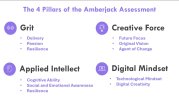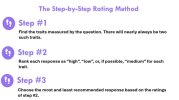Here's Amberjack's description of their four pillars
https://www.weareamberjack.com/why-assessments-for-potential-are-key-to-long-term-success/
Digital Mindset:
The natural inclination towards
technical solutions, automation, and digitalisation are important indicators of potential. With Peterson et al.’s (2018) Learning Model for Digital Affordances highlighting the different affordances offered by technology; Functional (operation), Perceptual (interpretation), and Adaptive (adaption and innovation), it is clear that prior knowledge of technology is not necessarily the only way to assess an individual’s strength in this area. Having a solution-based mindset and being able to explore
new ideas is crucial to establishing a candidate’s potential and Digital Mindset.
Grit:
The key components of Grit are
drive,
agility, and
resilience. Church and Silzer (2014) have identified resilience and emotional self-control as foundational personality characteristics that reliably predict leadership success and an individual’s ability to deal with and influence others.
Creative Force
The creativity involved in Creative Force differs from Digital Mindset in its process-driven and future-thinking nature, rather than the pure utilisation of creative digital solutions.
Creativity is the basis behind innovation; innovators identify opportunities for success and challenge existing frameworks, as posited by Kirton’s Adaptation-Innovation Theory (1989). In this way, our Creative Force pillar recognises candidates with the potential to add new ideas and approaches. Candidates with high levels of Potential enable significant change, challenge ineffective processes, and drive positive development
Applied Intellect
The basis for Applied Intellect is made up of three core characteristics; Social and Emotional Intelligence, Learning Agility, and Cognitive Ability.
Social and Emotional Intelligence becomes an important characteristic of individuals with high levels of potential. Self management of activity and emotional wellbeing is crucial, especially in the hybrid working world; individuals need to be accountable for outcomes and less closely monitored.
Social awareness and relationship management are essential for communication and effective group interactions whether they are physical, virtual, oral, or written.
Learning agility is the second key part of Applied Intellect. Learning agility, and the continual development this enables, has been found to more accurately predict long-term potential than past performance. Potential is about growth and persistent improvement, this is why “an individual’s current skill-set is of secondary importance to their ability to learn new knowledge, skills, and behaviours that will equip them to respond to future challenges”
Finally, cognitive ability, the general mental capability involving reasoning, problem solving, planning, abstract thinking, comprehension, and learning from experience (Gottfredson, 1997; Plomin & von Stumm, 2018), helps identify an individual’s capacity to apply their knowledge and intellect to a variety of situations.


